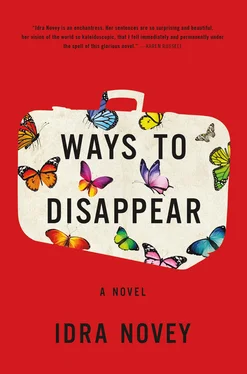Her cabdriver had a body as well, much of it on display beneath his pink muscle shirt, all of it glistening with sweat. When he asked her where she’d learned Portuguese, she told him about Beatriz.
But you must want to translate the real greats, he said, masters like Jorge Amado and Carlos Drummond.
So she told him about the warden in the tree, the island prison with its night orchestra of lizards, how it was one of those stories so strange and spare that it felt like a whispered, secret history of the world.
Oh, I know it. The Devil’s Cauldron, the driver said.
No, I believe she called it “The New Moon,” Emma replied.
I’m talking about the prison, he said. It gets hot as a pot of hell there on Ilha Grande.

Ilha what? I can’t understand your accent.
Flamenguinho let out a belch so explosive his eyes bulged like a toad’s. At the eruption, several people at the bar turned around slack-jawed. Emma couldn’t imagine Beatriz seeking out the company of such a man. Besides his belching problem, he had what appeared to be a tattoo of a trash can on his neck.
He also kept posing his questions to her breasts. Who’s helping her on Ilha Grande? he asked her shirt.
Well, I think it has more to do with this early story of hers, Emma said. It takes place on—
Rerp! Another belch detonated, and with such force that Flamenguinho had to grab hold of the table.
Listen, he said to her breasts, fuck the story. You know what I want? I want the six hundred thousand fucking dollars she owes me. Okay? I know she’s broke. So you need to get the damn book from her. Whatever you get for it in your country, half a million is mine, and then I won’t have to kill her.
Emma looked down at her hands. Her fingers had come together in what her yoga teachers called the bind. It didn’t seem like the time to explain that Elsewhere Press was just a woman named Judie in upstate New York and various interns from a small university nearby. For each book Judie published, she’d paid Emma the same amount she’d paid Beatriz: five hundred dollars. To make a living, Emma taught endless sections of “Portuguese for Spanish Speakers” at a branch campus of the University of Pittsburgh.
Her fingers still bound, she asked Flamenguinho how he’d gotten hold of her email, and he flared his nostrils.
See this? He opened his jacket to reveal the gun-shaped bulge in the left inside pocket. It would be deadly, he said, for you to assume I’m an idiot. I found you online like any other asshole, and if you sell her book and send me the money I won’t have to find you again. You hear what I’m saying?
Beset with a slight sensation of vertigo, Emma nodded. Of the various scenarios in which she’d imagined herself in Rio, receiving a threat of this nature was not one of them. She’d also never imagined her author as someone who would conceal an addiction, and certainly not to gambling. She’d translated every emotion Beatriz had ever written. They’d discussed hundreds of words and why Beatriz had chosen them over others. They’d sipped coffee together in their pajamas. Emma had gradually come to trust her understanding of her author’s impulses more than she did her own. If she couldn’t find Beatriz, she couldn’t find anyone.
I think I have an idea of where she might be, Emma told the shark sitting before her. If she’s finished the book, I’ll translate it as fast as I can. Whatever it makes in the U.S. is yours. I promise.
Promise:From the late Middle English prom-is. First known use 15th century. 1.A declaration of what a person intends to do, which may correspond to what a person actually does, or may not. 2.A verb used to assure of a certain outcome, as in: With time, a translator gets used to promising the impossible the way a loan shark gets used to promising carnage. See also:humanity after Babel, hangings during the Inquisition, chamber music in the dark.

Raquel let her brother open the door for Emma. She hadn’t wanted to deal with her mother’s translator yet, but Marcus said that Emma had come such a long way to help them. If she was eager to speak to them, they really couldn’t say no.
Raquel didn’t agree, but then she’d never understood why her mother let Emma stay in the guest room. A translator wasn’t family and her mother never referred to Emma as a friend. Yet every June her mother’s translator arrived, and so thin and high-strung it was impossible to relax when she was in the apartment. Her sunscreen was a problem, too. During Emma’s visits, the living room would begin to reek of those American lotions with an excess of zinc.
The story about the obese loan shark with the burps was just the sort of paranoid nonsense Emma would provide. A psychologist friend of her mother’s had already told them what must have happened. Her mother had suffered a sudden onset of amnesia or was in the throes of a dissociative fugue. How else to explain why a woman in her sixties would drag a suitcase into a tree?
Sure, her mother had always liked poker and liked to win. She often played poker games with them as children, and real games with her writer friends as well. In either case, she never gave away what sort of cards she was holding until the hand was over.
But her mother would never have played online, and for serious money. She’d never had serious money, and if a loan shark had observed what a good player her mother was and goaded her to raise the stakes with his money, her mother wouldn’t have risked it. What for? Her mother had a whole clan of elderly aunts in São Paulo who wired her cash whenever she needed it, although the calls had their cost, too. They always ended with her mother hunched over and apologizing, saying, You’re right, you’re right, that’s what I should’ve done.
As a teenager, Raquel had often made the calls for her. Each time, the aunts would recount the same story about her mother falling out of a tree as a child and hitting her head, how it explained everything. Still, the aunts always sent more than her mother requested. If her mother called too close to Shabbat, they wired the money first thing on Monday.
This man was making a joke of you, Raquel said to Emma.
He had a gun in his jacket.
Half the people in Rio have guns in their jackets, don’t they, Marcus? Raquel turned to her brother, but he’d taken a seat at their mother’s desk and was brushing aside various chocolate wrappers and crumpled napkins to find the keyboard.
Don’t turn on her computer, Raquel said. Leave it alone. She would never have gambled online. If she was on her computer, she was writing.
Marcus turned it on.

Until she met them, Emma hadn’t given much thought to the fact that her author had children. On her first visit to Brazil, she’d been caught off guard by the sight of a young man in the living room with the same radioactive-green eyes and high cheekbones as Beatriz. Marcus’s gaze, however, had none of his mother’s intensity. His stare was sensual and sleepy. Several nights a week, he tended bar at one of the most expensive clubs in Leblon, where, Emma had not been surprised to learn, he received such extraordinary tips he had no motivation to pursue anything else.
His older sister was the one who’d inherited their mother’s intensity, but on Raquel’s face it had worked out differently. Her eyes were small and suspicious, her default expression one of displeasure. When Emma first met her, Raquel had been furious about the unions she dealt with at a large mining company. Now she was at an even larger mining company and even more furious about the unions there.
Читать дальше













